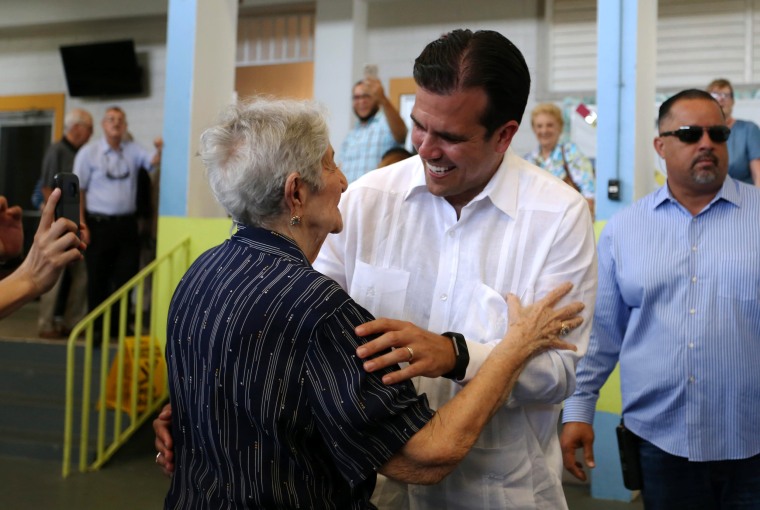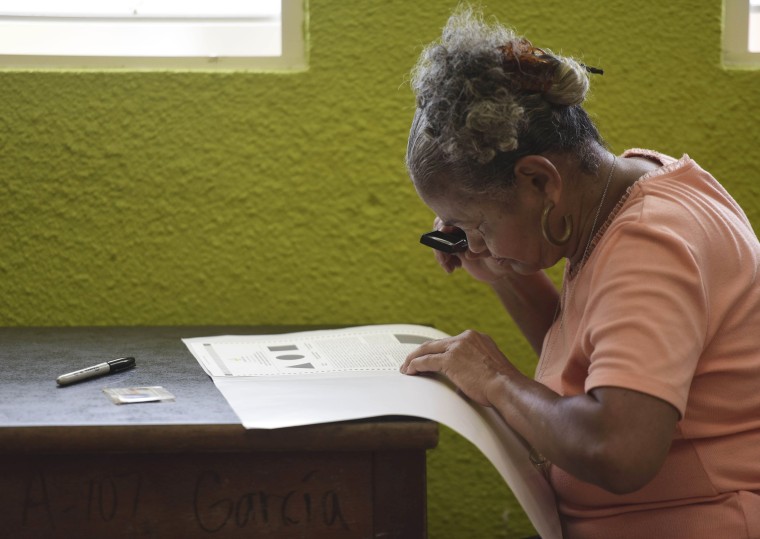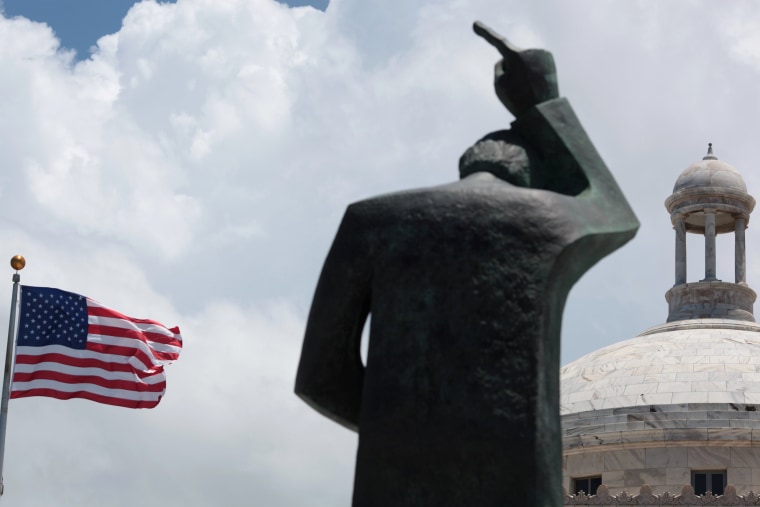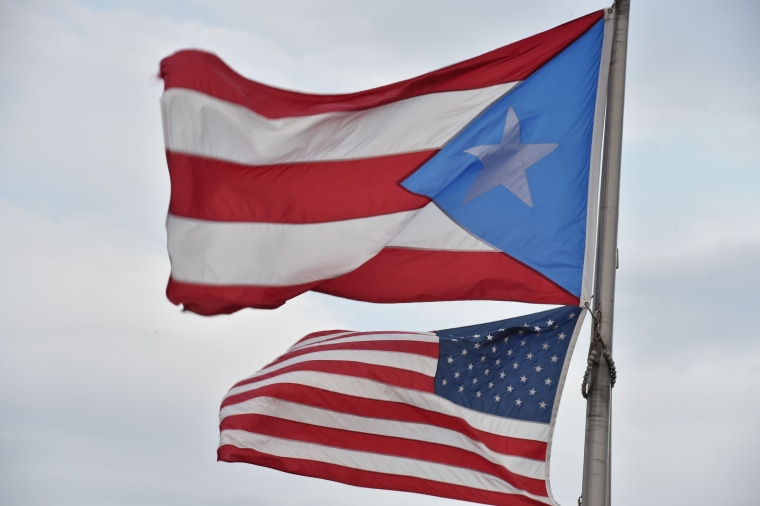Puerto Rico residents head to the polls Sunday to vote on whether the island should become the 51st U.S. state, a prospect that the island’s pro-statehood governor has been promoting as a way to help solve the island’s crippling debt crisis.
Gov. Ricardo Rosselló from the New Progressive Party (PNP in Spanish) and his government have been pushing for a “yes” for statehood on the non-binding referendum and have been spending on GOTV efforts and television and radio ads.

But the endeavor faces an uphill battle. The U.S. territory has been shuttering schools and cutting pensions, while watching its residents flee to the U.S. mainland in search of work and its government forced to adhere to an oversight board’s dictates.
The government is wrestling with a formidable $73 billion debt and is currently in the courts under a U.S. federal district judge trying to negotiate a form of bankruptcy process (Title III). As a U.S. territory and not a state, the island cannot file for bankruptcy like other states' municipalities.
For some, those realities supersede voting on Sunday’s non-binding referendum.
Charlyn Gaztambide Janer, a communications specialist who does not support statehood, does not plan to vote on Sunday.
RELATED: Opinion: The Misunderstood Puerto Rican Diaspora
“It's a big waste of money, to be quite honest. Puerto Rico is in the middle of an economic crisis. We can’t afford this. Why are we spending all this money on this (plebiscite) when it can be used to take care of other things that are much more urgent,” said Gaztambide Janer. "I really think this is a distraction for the government to not have to deal with the real issues, and when has the United States ever said they’re interested in Puerto Rico being a state?”
In addition to statehood, Puerto Ricans have the option of voting for the current commonwealth status or for free association/independence, which allows for free association with the U.S. or independence from the U.S.
Rosselló and other statehood supporters say it's time to end Puerto Rico being treated as second-class citizens as it is under the current commonwealth status. Puerto Ricans in the island cannot vote for U.S. president and the island receives less money from the federal government for government programs, Medicare and Medicaid for instance, while paying the same amount of payroll taxes as those living on the mainland.
The island’s political parties supporting the current commonwealth status (Popular Democratic Party, or PPD) and advocating for independence (Puerto Rican Independence Party, or PIP) or free association are calling for a boycott on Sunday, saying the plebiscite is a big waste of time.

Island political analyst Wilda Rodríguez tells NBC Latino the boycott is gaining a lot of steam and that will play a big part in what happens on Sunday.
“Supporters of the statehood platform have a serious problem. They are running in a race where there is really only one participant, and it doesn’t give the process any credibility. The plebiscite itself would have to have a large turnout overall, and that doesn’t look like it’s going to happen. And the statehooders expect to take those results and go to Washington and be taken seriously when it’s not a legitimate process,” said Rodríguez.
“This is costing a lot of money, between eight to 11 million dollars at a time when the island is in the middle of an economic crisis. We’re in the middle of drastic budget cuts to deal with the multi-billion dollar debt, such as closing schools, cutting pensions, but yet there’s money for this (plebiscite). This is nothing more than political theater and a distraction," Rodríguez said.

Historically, residents of the island have been pretty evenly divided between statehood and the current commonwealth status. In the last plebiscite, 62 voted for statehood, but there were issues with the way the options were laid and it led to questions about its accuracy.
None of that is deterring Emilio Martínez from going to the polls on Sunday. The island native spent several decades working in New York City before returning to Puerto Rico to retire, and is a supporter of statehood.
“First of all, I am exercising my right as a citizen to voice my opinion through my vote. If you don’t vote, then you don’t count," said Martínez. "Plus we want to send a message to the United States that we want to be full citizens. When I lived in New York, I could vote for president and for members of Congress, but now living in Puerto Rico I am an American citizen without the same rights as those who live on the mainland, and that is not right. Why shouldn’t I be able to vote for the people who govern us, who send our boys to war? The best option is statehood as full U.S. citizens.”
Several members of Congress from both parties are urging islanders to vote.
House Democratic Whip Steny Hoyer of Maryland, a statehood supporter, said in a statement, “I hope they will vote for statehood and remain part of our country as a full and equal member of our union. Puerto Ricans, all American citizens, have been a part of the American family for generations, and ties between the island and the mainland run very deep. Ultimately, Congress must respect the decision of the Puerto Rican people as they raise their voices through the ballot box."
Florida Republican Sen. Marco Rubio tweeted, "I encourage all voters on the island to participate in this plebiscite to communicate the will of the people to local and national leaders." Fellow Florida Republican Ileana Ros-Lehtinen also exhorted islanders to cast their ballots,
RELATED: Oscar López Rivera Steps Aside As Puerto Rican Day Parade Honoree
Rep. Luis Gutiérrez (D-IL), a supporter of independence for the island, said in a statement that Sunday's plebiscite is “a farce” and that not only has Congress never moved the process along after previous plebiscites, and stated it's even less plausible with the current administration.
“The supporters of statehood are selling a fantasy that a Latino, Caribbean nation will be admitted as a state during the era of Donald Trump (and) that states, many of which supported Trump, will accept a Spanish-speaking state," stated Gutiérrez. "Those who advocate statehood in Puerto Rico will claim that this Sunday’s vote is a referendum on statehood. That is a fiction, because it’s clear that only one party will participate in the one-sided election and because the U.S. Government has not made any sort of commitment to honor this vote.”
But colleague and fellow Puerto Rican Rep. José Serrano (D-NY) is taking a different approach than Gutiérrez, saying all island voters should turn out on Sunday, stating that “119 years as a territory is more than enough."
"It is time for Congress to address and solve Puerto Rico’s status once and for all," said Serrano. "The plebiscite this upcoming Sunday will serve as an opportunity to reopen the dialogue in Congress and start a conversation about Puerto Rico’s future. I encourage everyone on the island to participate in the plebiscite and make their voices heard."
If statehood wins as expected, the island government will enact the so-called Tennessee Plan, under which U.S. territories send a delegation to demand to be seated in Washington. The governor would send seven legislators – two senators and five representatives – later in the year after the plan is ratified.
In a recent visit to Washington, Roselló pushed back against criticism about conducting the plebiscite at this time. “This is a real process, important for the people of Puerto Rico, important for our determination."
Opponents say that would be yet another meaningless ritual, as Congress has never previously moved on the issue.
“You watch, they’ll go to Washington, and Washington is going to tell them yeah, okay, whatever, and it’ll go nowhere, as always,” Gaztambide told NBC Latino. “I’m going to stay home on Sunday and watch the Puerto Rican Day Parade from New York City and not waste my time on that (plebiscite).”
CORRECTION (June 10, 10:10 a.m. ET) An earlier version of this article misstated the ability of U.S. states to file for bankruptcy. States cannot file for bankruptcy, but their municipalities can. Puerto Rico, as a territory, cannot file for bankruptcy.
